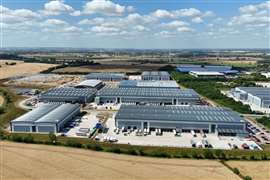Extec duo spearhead next generation recycling
01 August 2008

Extec track-mounted crushing and screening equipment is helping spearhead a new generation of high quality recycled aggregates at Gatwick Airport, UK.
The C-10+ mobile crusher and E-7 mobile screen are being used by Sustainable Aggregates to produce Structural Material for Reinstatement (SMR), at the company's new 1.2 ha recycling facility in Copthorne, Sussex. Having proved the viability of SMR at its original site in Avonmouth, Dorset the new site and acquisition of the two new Extec units signals a major expansion of Sustainable Aggregates' operations.
"At Avonmouth we proved that SMR could be produced and that there was a market for it," says managing director Clive Holloway. "Up until then, we had acted as a supplier to 14 SMR dealerships before taking the plunge in February and producing the finished product ourselves."
The take up of SMR, said Mr Holloway, is based almost entirely upon the quality and integrity of the finished product.
"Comparing ordinary Type 1 and SMR is like comparing chalk and cheese. Our customers have been astounded at the strength of the product.
"To ensure that we maintain the quality of the finished product, we must process the waste to the highest possible specifications. For that, we have to have the right equipment," he added.
At the heart of Copthorne's operation is the Extec C-10+ mobile crusher and E-7 screen. Fed by a Komatsu 210LC tracked excavator, the C10+ handles 10 to 14 loads of utility waste daily, reducing it to the required 50-60 mm grade.
The unit's grizzly bars remove the majority of fines, while oversized material is removed through a side conveyor for recrushing.
Some of the product from the crusher is stockpiled, explained Mr Holloway, as there is a ready market for conventional Type 1 as well as SMR. However the majority is fed into the E-7 screen by a JCB JS200JC tracked excavator, where the fines are removed and the crushed material sorted into products varying from 60 to 10 mm.
A Volvo EC240 excavator then loads the screened material into an Achiever mixer and trommel unit, where a binding agent is added to produce the SMR product.
Future plans
"At present, we are processing about 1000 tonnes of SMR each week," said Mr Holloway, "but we hope to produce 4000 tonnes per week in the near future. And the Extec machines are more than capable of achieving those levels of throughput"
With both its Copthorne and Avonmouth facilities established and demand on the rise, Mr Holloway hopes to have a further four sites operational by the end of the year, and by 2010, there should be 24 sites working across the UK.
The idea behind these small, local sites, he said, is to process locally, providing a product customised for individual clients, but without the vehicle movements required to move the product from large national depots.
"We already have top quality BSEN specifications and have applied for our CE mark. In my opinion, SMR products are the best way to reclaim and recover 100% of C&D waste. This is compared with the 40 to 60% achieved by conventional methods," he explained.
"The savings are enormous for the customer and they are an obvious way of avoiding landfill taxes and reducing their carbon footprint. Once the sites are running to speed they should produce a product that is cost neutral and the productivity of the two Extec machines will help achieve that," added Mr Holloway.




